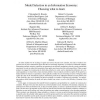1047 search results - page 13 / 210 » Learning the required number of agents for complex tasks |
AAAI
2010
13 years 9 months ago
2010
Decentralized agent groups typically require complex mechanisms to accomplish coordinated tasks. In contrast, biological systems can achieve intelligent group behaviors with each ...
ATAL
2006
Springer
13 years 11 months ago
2006
Springer
As agent systems are solving more and more complex tasks in increasingly challenging domains, the systems themselves are becoming more complex too, often compromising their adapti...
ATAL
2007
Springer
14 years 1 months ago
2007
Springer
Transfer learning problems are typically framed as leveraging knowledge learned on a source task to improve learning on a related, but different, target task. Current transfer met...
ATAL
2004
Springer
14 years 1 months ago
2004
Springer
One of the main challenges in Grid computing is efficient allocation of resources (CPU-hours, network bandwidth, etc.) to the tasks submitted by users. Due to the lack of centrali...
CI
2002
13 years 7 months ago
2002
As online markets for the exchange of goods and services become more common, the study of markets composed at least in part of autonomous agents has taken on increasing importance...

